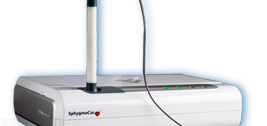Px
Home > Products > SphygmoCor > Px
SphygmoCor® Px
The SphygmoCor Px system provides central blood pressures and key heart function parameters for theassessment and management of cardiovascular risk and disease. SphygmoCor Px derives the calibrated
blood pressure waveform at the ascending aorta from a transcutaneous recording of the radial artery
pressure waveform.
Features
From the aortic pressure waveform, the system calculates a range of indices of arterial stiffness, ventricular-arterial interaction, and cardiac function, such as:- Aortic Systolic pressure (Sp), which can differ markedly from brachial Sp
- LV Load and systolic afterload, key parameters affecting LV hypertrophy risk
- Diastolic Perfusion Pressure and cardiac reserve index, key parameters affecting MI risk
- Aortic Augmentation Index (AIx), a measure of systemic arterial stiffness
- Central Pulse Pressure, an improved measure of stroke risk
- Ejection Duration (ED) and Subendocardial Viability Ratio
key parameters for distinguishing systolic vs.
diastolic dysfunction, and for managing efficacy of CHF therapy

Benefits
- Improves characterization and stratification of CV risk
- Provides a powerful clinical capability for managing CHF patients with diastolic dysfunction
- Provides a clinical tool to diagnose and manage arterial stiffening due to aging and disease
- Improves ability to optimize drug therapy by allowing direct management of the central CV paramaters

System Specifications
SphygmoCor® Pulse Wave Analysis System: Model SCOR-Px
Standard system configuration
- SphygmoCor signal processing electronics module
- SphygmoCor software system
- SphygmoCor pressure tonometer
- System documentation
Performance and operating specifications
-
Report format
Standard clinical patient report includes:
- Averaged central aortic waveform
- Quality Control Parameters
- Three key central parameters including arterial stiffness indicator, with graphs representing normal ranges
- Parallel display of the captured peripheral pulse waveform and simultaneously calculated central aortic pulse waveform
- Side-by-side display of the averaged recorded peripheral pulse waveform and the averaged derived aortic pulse waveform
- Systole and diastole timing
- Derived central indices for the dynamics of ventricular-vascular interaction
- Quality Control Parameters Derived data The SphygmoCor System derives calibrated ascending aorta blood pressure profiles from peripheral waveforms recorded at the:
- Radial artery
- Carotid artery
- Heart Rate
- Ejection duration
- True mean pressure
- Time to the peaks of the primary ejection pulse and the reflected pulse
- Augmentation index (due to wave reflection)
- Arterial stiffness indicator
- Systolic and diastolic pressure
- Pulse pressure height
- Augmented pressure and augmentation index (due to wave reflection)
- End systolic pressure
- True mean pressure – in systole & diastole
- Pressure-time index – in systole & diastole
- Subendocardial viability ratio (Buckberg) Calibration The recorded radial pressure wave contour is calibrated using the brachial pressures as measured by conventional cuff sphygmomanometry. Software features
- Patient database in Microsoft® Access format
- Improved waveform feature extraction
- Export Function allows data to be readily analysed with Excel, SPSS, etc
- Up to twenty patient databases can be set up for different studies
- Patient analysis & parameter trends by viewing selected averaged waveforms in a chronological sequence
- Batch printing of selected reports
- Auto-scaling of peripheral signal and display of the last 10 sec of data during tonometery signal capture
- Patient listing facility – to view and print last time a patient undertook a study Minimum computer requirements
- IBM compatible PC: Pentium III/Celeron Processor 400 MHz; 128 MB RAM; 800x600 256 color SVGA Display; 100 MB initial free hard disk space (more for data storage), CD-ROM drive
- Equipment interface: RS-232 serial or USB port
- Operating System: Windows 98SE/ME/2000/XP
- Printing: Windows Compatible Printer Operating conditions:
- Ambient temperature: 15-30°C
- Relative humidity: 20-80% Power supply (mains power):
- ?220-240 VAC, 50 Hz
- 100-110 VAC, 50/60Hz
- 12VA
Detailed patient report includes:
Pressure waveform analysis (for both the peripheral artery and aortic waveforms) provides:
Further analysis provides at the ascending aorta:
Regulatory
- FDA 510K K012487
- EU CE Mark (MDD, ANNEX II, Class IIa)
- MHLW, Japan
- TGA, Australia
- IEC 60601-1/ AS/NZS 3200.1 (amendments 1 and 2) Electromedical Equipment Safety standard
- IEC 60601-1-2 Electro-Medical Equipment, ElectroMagnetic Compliance (EMC) Standard

